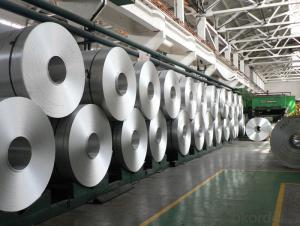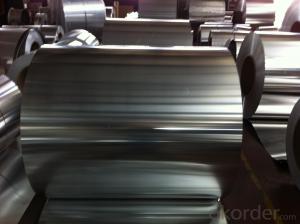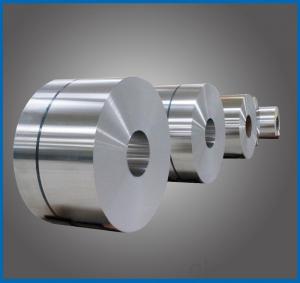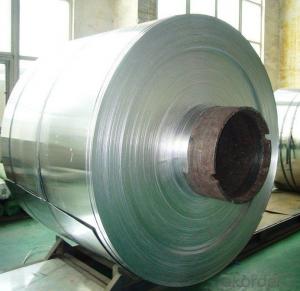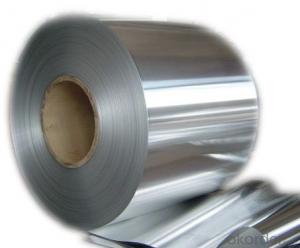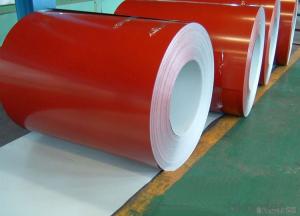hot roll aluminium coil 4.5mm
- Loading Port:
- China Main Port
- Payment Terms:
- TT OR LC
- Min Order Qty:
- -
- Supply Capability:
- -
OKorder Service Pledge
Quality Product, Order Online Tracking, Timely Delivery
OKorder Financial Service
Credit Rating, Credit Services, Credit Purchasing
You Might Also Like
We produce prepainted aluminum coil and strip for aluminum twist off and crown caps production professionally.
The detail information as following:
Thickness :0.10mm-0.30mm
Prepainted: PE, PVDF and others
Width :20-1500mm
Alloy : 8011 mainly
Temper : H16
Usege: Twist off and caps
Pack details:pack in rolls with plastic film by wooden box.
Container loading: 1x20ft container can load about 18 tons.
- Q:Can aluminum coils be bent or shaped?
- Indeed, aluminum coils possess the capability of being bent and shaped. Aluminum, as a remarkably malleable and ductile metal, can undergo manipulation and take on diverse forms effortlessly, without experiencing any fractures or cracks. The pliability of aluminum grants it the capacity to be bent, rolled, or molded into coils, solidifying its prominence in a wide array of applications, including the production of air conditioning units, automotive components, and packaging materials. The flexibility and shape-altering potential of aluminum coils render them exceptionally versatile and adaptable to meet specific design specifications, facilitating efficient and precise customization across a multitude of industries.
- Q:Are there any specific installation requirements for aluminum coils?
- Aluminum coils have specific installation requirements that must be taken into account. When installing these coils, several factors need to be considered. First and foremost, it is crucial to provide adequate support and secure the coils properly during installation. Due to their weight, it is essential to prevent sagging or damage by using appropriate brackets or support structures. This ensures that the coils are firmly mounted. Secondly, the location and environment of the installation should be carefully assessed. Aluminum coils are commonly used in HVAC systems, so it is important to ensure that the installation area is free from any corrosive substances or chemicals that could harm the coils. Additionally, proper ventilation is necessary to prevent the accumulation of heat or moisture, as these factors can affect the coils' performance and lifespan. Moreover, it is imperative to adhere to the manufacturer's guidelines and recommendations for installation. These guidelines may include specific instructions regarding the type of fasteners or connectors to be used, the appropriate spacing between coils, and any other particular requirements for the specific aluminum coil being installed. By following these guidelines, the coils' optimal performance and longevity can be ensured. Lastly, it is highly advisable to enlist the services of a professional with experience in handling and installing aluminum coils. This will minimize the risk of any issues or damage resulting from incorrect installation. In conclusion, specific installation requirements for aluminum coils encompass proper support, consideration of the installation environment, adherence to manufacturer guidelines, and professional installation. By following these requirements, the optimal performance and longevity of aluminum coils can be achieved.
- Q:And if the deodorant companies know that aluminum causes cancer, why do they keep putting it in their products?
- to okorder /
- Q:How do aluminum coils contribute to energy efficiency?
- Aluminum coils contribute to energy efficiency in several ways. Firstly, aluminum is a highly conductive metal, which means it can efficiently transfer heat. When used in HVAC systems, aluminum coils help in the efficient transfer of heat between the air and the refrigerant, allowing for quicker cooling or heating of the space. Secondly, aluminum coils are lightweight and have a high strength-to-weight ratio. This characteristic makes them easier to handle and install, reducing the overall weight of the HVAC system. The reduced weight not only makes transportation and installation more efficient but also reduces the load on the building structure. Furthermore, aluminum coils are durable and corrosion-resistant. This longevity ensures that the HVAC system operates smoothly over an extended period, minimizing the need for frequent repairs or replacements. As a result, less energy is wasted on maintaining or replacing components, leading to better energy efficiency. Additionally, aluminum is a recyclable material, and using aluminum coils in HVAC systems promotes sustainability. The recycling process for aluminum requires significantly less energy compared to producing new aluminum, thus reducing the overall carbon footprint and energy consumption. Lastly, aluminum coils are often manufactured with enhanced fin designs and advanced technology, such as microchannel coils. These innovations increase the surface area of the coil, improving heat transfer efficiency and reducing the energy required for cooling or heating. Overall, aluminum coils contribute to energy efficiency by facilitating efficient heat transfer, reducing system weight, promoting durability, supporting sustainability through recycling, and incorporating advanced technology to enhance heat exchange.
- Q:How do aluminum coils contribute to improved building aesthetics?
- Improved building aesthetics can be achieved through the use of aluminum coils in several ways. To begin with, sleek and modern exterior finishes can be created for buildings using aluminum coils. Various finishes, such as brushed, anodized, or painted, can be applied to the coils, providing a wide range of design possibilities. Architects and designers can thus achieve their desired aesthetic vision for the building with the help of this versatility in finishes. Furthermore, aluminum coils offer the advantage of being easily shaped and formed into different profiles, resulting in a unique and customized look for buildings. By bending, cutting, or perforating the coils, intricate patterns or architectural details can be created, enhancing the overall aesthetics of the structure. This flexibility in shaping allows for the creation of visually appealing designs that can make a building stand out. Moreover, aluminum coils possess the qualities of being lightweight yet durable, making them an ideal choice for cladding systems. Using aluminum coils as exterior cladding can give buildings a modern and clean appearance. The lightweight nature of the coils also makes installation easier and more cost-effective, ultimately contributing to improved building aesthetics. Additionally, the use of aluminum coils aligns with sustainable building practices and environmentally friendly designs. Aluminum is a highly recyclable material, and buildings that incorporate aluminum coils can be seen as more visually appealing due to their eco-friendly attributes. This reflects the values of the project and its occupants. In conclusion, aluminum coils contribute to improved building aesthetics through their wide range of finishes, their ability to be shaped and customized, their lightweight and durable nature for cladding, and their promotion of sustainable design practices.
- Q:What is the thermal conductivity of aluminum coils?
- The thermal conductivity of aluminum coils is high, making them efficient in transferring heat.
- Q:Are aluminum coils suitable for beverage can manufacturing?
- Yes, aluminum coils are suitable for beverage can manufacturing. Aluminum is a preferred material for beverage cans due to its various advantageous properties. Firstly, aluminum is lightweight, which makes it easy to transport and handle. This is particularly important for the beverage industry, where large quantities of cans are produced and distributed. Additionally, aluminum is highly malleable, allowing it to be formed into the desired shape without losing its structural integrity. This makes it ideal for can manufacturing, as it can be easily shaped into a can's cylindrical form and withstand the pressure from carbonated beverages. Moreover, aluminum is a non-toxic material, ensuring that it does not contaminate the beverages stored in the cans. It also provides a barrier against light, oxygen, and moisture, which helps to preserve the taste and quality of the beverages. Furthermore, aluminum is recyclable, making it an environmentally friendly choice for can manufacturing. The recycling process for aluminum requires significantly less energy compared to producing new aluminum, making it a sustainable material option. Overall, the suitability of aluminum coils for beverage can manufacturing is evident due to its lightweight nature, malleability, non-toxicity, preservation properties, and recyclability.
- Q:Will the surface of the aluminum sheet touch the water?Aluminum rolls weighing 3.463 tons,.35mm thick, 900mm wide, very tight coil, is a mechanical binding. Water does not penetrate the surface of aluminium rolls
- Do you want to ask if the water has seeped into the crevice?If you get it soon, there should be no problem. No, you can just sun it and see if there's any water coming out of it
- Q:Are aluminum coils available in custom sizes?
- Yes, aluminum coils are available in custom sizes. Aluminum coils are versatile and can be manufactured to meet specific size requirements. This flexibility allows for a wide range of applications across various industries. Whether it's for HVAC systems, transportation, construction, or other purposes, aluminum coils can be custom-made to fit the specific needs of a project. Custom-sized aluminum coils ensure a perfect fit and optimal performance, offering greater efficiency and cost-effectiveness.
- Q:How do aluminum coils contribute to reduced maintenance costs?
- Aluminum coils contribute to reduced maintenance costs primarily due to their exceptional durability and resistance to corrosion. Unlike other metals, such as copper, aluminum coils are specifically designed to withstand harsh environmental conditions, including exposure to moisture, salt, and chemicals. This resistance to corrosion ensures that the coils remain intact and functional for extended periods, minimizing the need for frequent repairs or replacement. Additionally, aluminum coils are lightweight, making them easier to handle and install, which reduces labor costs associated with maintenance activities. Furthermore, their high thermal conductivity allows for efficient heat transfer, resulting in increased energy efficiency and lower utility bills. Overall, the use of aluminum coils in HVAC systems helps to reduce maintenance expenses and prolong the lifespan of the equipment, making them a cost-effective choice for both residential and commercial applications.
1. Manufacturer Overview |
|
|---|---|
| Location | |
| Year Established | |
| Annual Output Value | |
| Main Markets | |
| Company Certifications | |
2. Manufacturer Certificates |
|
|---|---|
| a) Certification Name | |
| Range | |
| Reference | |
| Validity Period | |
3. Manufacturer Capability |
|
|---|---|
| a)Trade Capacity | |
| Nearest Port | |
| Export Percentage | |
| No.of Employees in Trade Department | |
| Language Spoken: | |
| b)Factory Information | |
| Factory Size: | |
| No. of Production Lines | |
| Contract Manufacturing | |
| Product Price Range | |
Send your message to us
hot roll aluminium coil 4.5mm
- Loading Port:
- China Main Port
- Payment Terms:
- TT OR LC
- Min Order Qty:
- -
- Supply Capability:
- -
OKorder Service Pledge
Quality Product, Order Online Tracking, Timely Delivery
OKorder Financial Service
Credit Rating, Credit Services, Credit Purchasing
Similar products
New products
Hot products
Hot Searches
Related keywords
